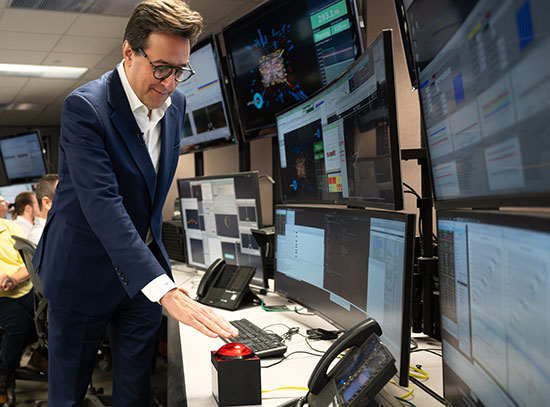PASER: A Novel Acceleration Scheme Demonstrated at Brookhaven Lab
September 21, 2006
UPTON, NY — A group of scientists from the Technion-Israel Institute of Technology has used the Accelerator Test Facility (ATF) at the U.S. Department of Energy's Brookhaven National Laboratory to demonstrate, for the first time, the feasibility of particle acceleration by stimulated emission of radiation (PASER), a kind of particle analog of the laser process.
The technology may provide a brand new tool for the emerging field of nanoscience because the "cool" electrons produced will enable more precise x-ray probes of ultra-small structures. Both the essence of the concept and the proof-of-principle experiment performed at the ATF are described in an upcoming publication in Physical Review Letters.
"This is the first experimental evidence that energy can be transferred from excited atoms/molecules to free electrons in a coherent way," said Samer Banna, a co-author on the paper with Levi Schächter and Valery Berezovsky. "In other words, this is the first demonstration of coherent collisions of the second kind."
A collision of the second kind takes place when a moving electron collides with an excited atom/molecule and energy is transferred from the latter to the former. In coherent collisions, the energy transfer due to multiple collisions may significantly increase the kinetic energy of the moving electrons.
The researchers have shown that energy stored in a carbon dioxide (CO2) mixture is transferred directly to an electron beam, which was initially bunched by the powerful ATF CO2 laser in order to ensure significant energy transfer. Each accelerated electron has undergone roughly two million collisions with excited CO2 molecules, generating no heat in the process.
Banna explained the PASER and LASER analogy: "In the latter case, photons traveling through an active medium stimulate the excited atoms, which release their energy in the form of additional photons," he said. "In the PASER experiment, the active medium surrenders its energy directly to the electrons."
Although the effect observed in this proof-of-principle experiment is modest, Banna emphasized that future PASER experiments will aim to significantly increase the gain in acceleration.
2006-10538 | INT/EXT | Newsroom









